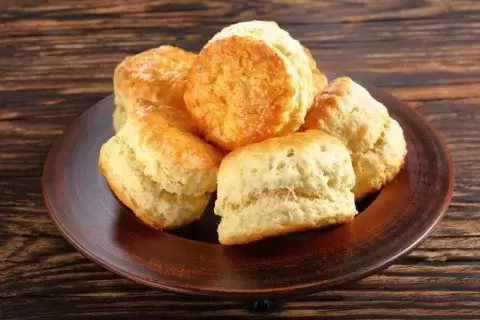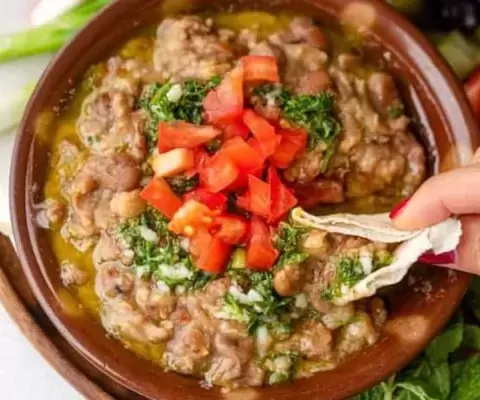Scones are a classic and beloved baked good that originated in the United Kingdom. These delightful pastries are known for their tender and crumbly texture, making them perfect for afternoon tea or as a breakfast treat.
Scones are typically made with a simple combination of flour, butter, sugar, and milk or buttermilk. The dough is gently mixed and then rolled out before being cut into round or triangular shapes.
Once baked, scones develop a golden crust while remaining soft and flaky on the inside. They can be enjoyed plain or enhanced with additions such as dried fruits, chocolate chips, or nuts. Scones are often served with clotted cream, jam, or honey, allowing for a delightful balance of sweetness and richness.
Whether enjoyed warm or at room temperature, scones are a timeless delicacy that brings comfort and satisfaction to anyone lucky enough to indulge in their delectable simplicity.
Introduction
Scones are a beloved British classic that has made its way into the hearts and palates of food enthusiasts worldwide. These delightful treats are perfect for breakfast, brunch, or a teatime indulgence.
In this post, I'll guide you through a simple yet scrumptious recipe for homemade scones, revealing the secrets to achieving that perfectly flaky texture and buttery flavor.
Ingredients of Scones
- 2 cups all-purpose flour
- 1/4 cup granulated sugar
- 1 tablespoon baking powder
- 1/2 teaspoon salt
- 1/2 cup unsalted butter (cold and cubed)
- 1/2 cup milk (plus extra for brushing)
- 1 teaspoon vanilla extract
- Optional add-ins: dried fruits, chocolate chips, or nuts
Preparation of Scones
- Preheat your oven to 425°F (220°C). Line a baking sheet with parchment paper.
- In a large mixing bowl, whisk together the flour, sugar, baking powder, and salt until well combined.
- Add the cold, cubed butter to the flour mixture. Using a pastry cutter or your fingertips, work the butter into the dry ingredients until the mixture resembles coarse crumbs with pea-sized butter chunks.
- In a separate bowl, combine the milk and vanilla extract. Gradually pour the milk mixture into the dry ingredients while stirring gently with a fork until the dough starts to come together.
- If desired, fold in any add-ins such as dried fruits, chocolate chips, or nuts.
- Turn the dough out onto a lightly floured surface and gently knead it a few times to bring it together. Be careful not to overwork the dough, as this could result in tough scones.
- Pat the dough into a 1-inch thick round circle. Using a floured biscuit cutter or a glass, cut out scones from the dough, placing them onto the prepared baking sheet.
- Brush the tops of the scones lightly with milk to give them a golden-brown finish.
- Bake the scones in the preheated oven for 12-15 minutes, or until they are golden brown and cooked through.
- Once baked, transfer the scones to a wire rack to cool slightly. Serve warm or at room temperature.
Special Equipment for Scones
- Pastry cutter or your fingertips for incorporating butter into the dry ingredients.
- Biscuit cutter or a glass for cutting out scones.
Serving Suggestions for Scones
Scones are incredibly versatile and can be enjoyed in various ways. Here are a few serving suggestions:
- Classic: Serve warm scones with clotted cream and strawberry jam, following the traditional British afternoon tea style.
- Brunch: Pair savory scones with bacon, eggs, and a side of fresh greens for a satisfying brunch.
- Dessert: Drizzle a sweet glaze over cooled scones and serve them with a dollop of whipped cream or a scoop of your favorite ice cream.
Nutritional Value of Scones
The nutritional value of scones can vary depending on the specific ingredients and add-ins used. On average, a plain scone contains approximately 200-250 calories, 8-10 grams of fat, 30-40 grams of carbohydrates, and 4-6 grams of protein. It's worth noting that the nutritional content may change if you choose to incorporate additional ingredients or serve the scones with spreads or toppings.
Cultural & Traditional Value of Scones
Scones have a rich cultural and traditional value, particularly in British cuisine. They have been a staple in British teatime traditions for centuries, often served with clotted cream and jam during afternoon tea. Scones are also popular in other parts of the world and have become a beloved treat enjoyed during various occasions, from breakfast gatherings to elegant brunches. The act of baking and sharing scones can bring people together and create a sense of warmth and comfort.
Conclusion
Homemade scones are a delightful treat that can elevate any occasion. With their flaky texture and buttery flavor, they are sure to please both your family and guests. Whether enjoyed in a traditional British style or with a creative twist, scones are a versatile baked good that will always bring a touch of indulgence to your table. So go ahead, whip up a batch of these heavenly treats, and savor the joy of homemade scones!














